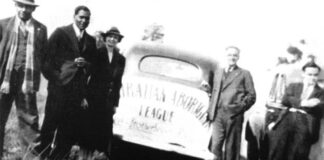The bashing murder on July 25 of young Aboriginal man, Kwementyaye Ryder, by a group of five white men highlights the violent extremes of racism festering in Alice Springs.
Police claim the murder “was not racially motivated”. But locals report seeing the men driving around the Todd riverbed shouting racist abuse at Aboriginal campers just prior to the murder.
On September 25, Mr Ryder’s remembrance cross at the location of the bashing was burned.
Earlier in September, “White Power Alice Springs” merchandise emblazoned with swastikas was openly sold from a car in front of Alice Springs Town Council offices by local man Dennis Donahue.
Donahue initially claimed to have been selling the “popular” shirts for months, “I’ve sold them to police … I’ve sold them to nurses, school teachers.”
Over three days, police and council officials refused several requests to stop the sales.
Mayor Damien Ryan even used these requests to promote proposed council bylaws, saying they would have allowed the council to step in. But the bylaws largely scapegoat homeless Aboriginal people, with fineable offences such as “begging” and “camping”.
After widespread local condemnation and national media attention, Donahue was finally charged with “offensive behaviour”. A protest against racism is planned outside his sentencing on October 14.
Intervention to blame
These incidents are not isolated—the last two years in Alice Springs have seen an alarming increase in white supremacy vigilantes harassing and abusing Aboriginal people.
The blame for increasing racism lies at the feet of the federal government.
Barbara Shaw, a resident of Mt Nancy town camp and spokesperson for the Intervention Rollback Action Group says, “We’ve got racial tensions in this town because of the NT Intervention. They suspended the Racial Discrimination Act to roll out a policy which treats Aboriginal people as second-class citizens. This opened the door for more racism from the general community”.
The Intervention started amid sensationalised claims of “paedophile rings” operating on town camps and in remote communities—claims the Australian Crime Commission have found to be false.
Aboriginal culture was put forward as the cause of poverty and violence in communities—justifying the removal of basic human rights and land rights.
Recent moves to dismantle bi-lingual education programs have further strengthened ideas of white superiority—spurring bigots to action.
As Barbara Shaw told CAAMA news, “Non-Aboriginal people are throwing food at Aboriginal people out of their cars at night time, they are coming into our town camps swearing and carrying on, throwing things at people’s homes. We get it when we have to go into the stores and line up with the BasicsCard—when’s it going to stop?”
A sharp spike in abuse directed at town camp residents has come at the same time Minister Jenny Macklin has been demonising residents of the Aboriginal town camps, in preparation for compulsory acquisition of their land and housing.
A resident of Kunoth town camp who did not wish to be named stated, “The government should be aware of the kind of divisions their policies are creating on the ground in Alice Springs. Jenny Macklin’s comments about violence and abuse in the town camps and communities are giving outsiders license to come in and give us trouble.”
“When the government is constantly saying Aboriginal people can’t manage themselves or their money, and forcing us to line up separately to use basic cards in the shops it says to everyone else ‘Aboriginal people are shit’ and makes it okay for everyone else to shit on us.”
Racist policies, including alcohol restrictions, have also given the police more confidence to target Aboriginal people. There have been at least four deaths in custody in Central Australia this year and a 10 per cent increase in Aboriginal incarceration rates since the Intervention began.
A September report from the Australian Institute of Criminology shows Aboriginal youth are routinely detained by police where non-Indigenous youth would receive a caution. Three quarters of youth arrested in the NT are Aboriginal.
Many Alice Springs residents are alarmed at the increasing levels of violence and abuse in the community and there are calls for more action and public dialogue.
A recent statement published in the Centralian Advocate and signed hundreds of individuals and organisations stated: “We deplore all acts of violence, including those that have been perpetrated against Kwementyaye Ryder and his family. We value the positive cross-cultural relationships we enjoy in Alice Springs and reject all acts of racism.”
United action against the Intervention will be key to pushing back the racists and stopping the attacks.
By Lauren Mellor





